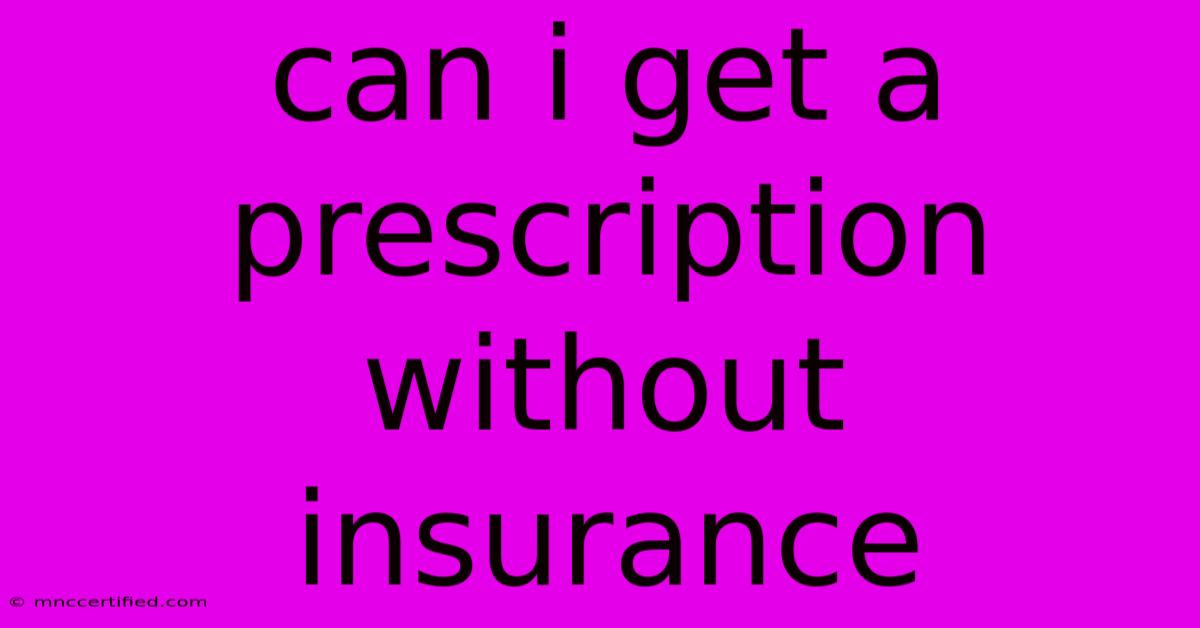Can I Get A Prescription Without Insurance

Table of Contents
Can I Get a Prescription Without Insurance? Navigating Healthcare Costs
It's a common question: "Can I get a prescription without insurance?" The answer isn't simple, and depends on several factors, including your location, the specific medication, and your financial situation. Let's explore the options available to you.
Understanding the Challenges
The healthcare system can be complex, and navigating medication costs without insurance can feel overwhelming. Here's why:
- High Prescription Drug Costs: Pharmaceutical companies often set high prices for medications, making them inaccessible for many.
- Limited Access to Doctors: Some doctors might be hesitant to prescribe medications without a patient having insurance, as they might worry about payment.
- Lack of Financial Assistance Programs: While some programs exist, finding and qualifying for them can be challenging.
Exploring Your Options
Despite the challenges, there are ways to obtain prescriptions without insurance. Here's what you can try:
1. Check for Patient Assistance Programs (PAPs):
- Pharmaceutical Company Programs: Many pharmaceutical companies offer programs that provide free or discounted medications to eligible patients. Research the manufacturer of your medication to see if they offer a PAP.
- Non-Profit Organizations: Organizations like the NeedyMeds and Partnership for Prescription Assistance help connect patients with financial assistance programs and resources.
2. Consider Generic Medications:
- Lower Cost: Generic medications contain the same active ingredients as brand-name drugs but are typically much cheaper. Ask your doctor if a generic option is available for your prescription.
3. Negotiate with Your Doctor:
- Be Transparent: Explain your financial situation to your doctor and ask for their help in finding affordable options. Some doctors might be willing to adjust their fees or recommend lower-cost alternatives.
4. Explore Discounted Prescription Programs:
- Retail Pharmacy Programs: Major pharmacy chains like Walmart, CVS, and Walgreens offer discount programs for uninsured patients.
- Online Prescription Services: Some online services connect patients with doctors and pharmacies to offer medication at discounted rates.
5. Contact Your Local Health Department:
- Public Health Resources: Your local health department might offer programs for low-income individuals, including access to free or subsidized medications.
6. Consider a Health Savings Account (HSA):
- Long-Term Savings: An HSA allows you to contribute pre-tax dollars to cover healthcare expenses, including prescription drugs. This can be a valuable tool if you expect to have ongoing healthcare costs.
Additional Tips for Managing Prescription Costs
- Shop Around: Compare prices at different pharmacies for your medication, as prices can vary significantly.
- Utilize Prescription Coupons: Websites like GoodRx and RetailMeNot offer printable coupons and discount codes for medications.
- Ask About Medication Samples: Your doctor might have samples available for you to try before committing to a full prescription.
Seek Professional Guidance
If you are struggling to afford your medications, don't hesitate to reach out for help. Contact your doctor, local health department, or a patient assistance program for personalized guidance and support.
Remember, navigating healthcare costs can be challenging, but there are resources available to help. By exploring these options and seeking professional advice, you can increase your chances of obtaining the medication you need without straining your finances.

Thank you for visiting our website wich cover about Can I Get A Prescription Without Insurance. We hope the information provided has been useful to you. Feel free to contact us if you have any questions or need further assistance. See you next time and dont miss to bookmark.
Featured Posts
-
How Long To Keep Certificates Of Insurance
Nov 07, 2024
-
Washington Lieutenant Governor Election 2024 Real Time Results
Nov 07, 2024
-
Wisconsin Voters Ban Affirmative Action
Nov 07, 2024
-
What Insurance Does Morrison Dental Accept
Nov 07, 2024
-
Morning Stars Cancer Journey Early Signs
Nov 07, 2024